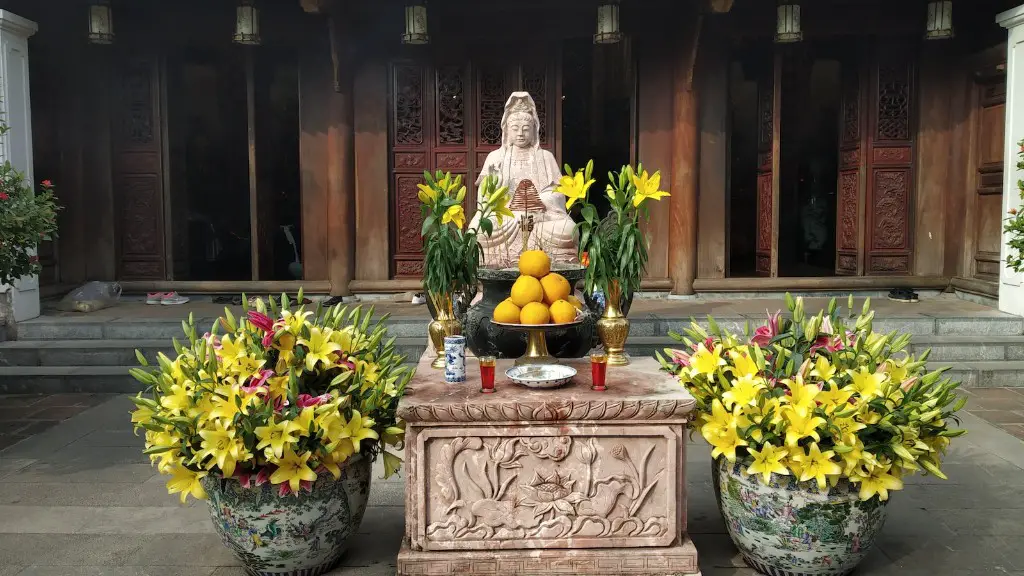Mahayana Buddhism is one of the two main branches of Buddhism and is widely practiced in countries like China, Japan, and Korea. The Mahayana branch of Buddhism emphasizes the bodhisattva path, the path of the Buddha-to-be, in which one strives to attain Buddhahood for the benefit of all Sentient beings.
Mahayana Buddhism is a branch of Buddhism that stresses the importance of compassion and altruism. Unlike other schools of Buddhism, Mahayana Buddhism teaches that every living being has the potential to become a Buddha. The goal of Mahayana Buddhism is to achieve nirvana, or perfect enlightenment.
What is the main belief of Mahayana Buddhism?
There are several different schools of thought within Buddhism, and Mahayana is just one of them. Mahayana Buddhists believe that everyone has the potential to achieve salvation, and that it’s possible to help others achieve it as well. In contrast, Hinayana Buddhists believe that each person is responsible for their own fate, and that it’s not possible to help others achieve salvation. There are also other schools of Buddhism, such as Zen Buddhism from Japan and Hindu Tantric Buddhism from Tibet.
Mahayana Buddhism is the largest Buddhist sect in the world, and its beliefs and practices are what most non-adherents recognize as “Buddhism” in the modern era. It developed as a school of thought sometime after 383 BCE, possibly from the earlier school known as Mahasanghika, though that claim has been challenged.
Mahayana Buddhism emphasises the bodhisattva path, whereby practitioners seek to become bodhisattvas, beings who are able to attain Nirvana but who postpone doing so out of compassion for all sentient beings. This path is accessible to laypeople as well as monastics, and is reflected in the wide range of Mahayana literature, from the early sutras to the more philosophical later texts.
Mahayana Buddhism is also notable for its emphasis on the notion of emptiness (sunyata), which is central to the Mahayana understanding of reality.
What is Mahayana Buddhism in simple words
Mahayana Buddhism is a branch of Buddhism that sees the goal of becoming a Buddha through the bodhisattva path as being available to all. Mahayana also includes numerous Buddhas and bodhisattvas that are not found in Theravada, such as Amitabha and Vairocana.
In the Mahayana tradition, worship takes the form of devotion to the Buddha and to Bodhisattvas. Worshippers may sit on the floor barefoot, facing an image of the Buddha, and chanting. They will listen to monks chanting from religious texts, perhaps accompanied by instruments, and take part in prayers.
How is Mahayana Buddhism different from Buddhism?
Buddhism sees the world as a realm of transmigration, or reincarnation (samsara), from which one may escape by attaining nirvana. In the Mahayana tradition, the emphasis is less on nirvana and more on knowledge or wisdom, the mastery of which constitutes awakening.
The Mahayana tradition of Buddhism is centered around the goal of not only achieving liberation from suffering for oneself, but also leading others to liberation and enlightenment. This tradition emphasizes compassion and altruism, and focuses on the Buddha-nature that is present in all beings. Mahayana Buddhists strive to develop their own Buddha-nature in order to be able to better help others achieve the same.
What are the three concepts of Mahayana Buddhism?
Trikaya is a key concept in Mahayana Buddhism that refers to the three bodies, or modes of being, of the Buddha. The three bodies are the dharmakaya (body of essence), the sambhogakaya (body of enjoyment), and the nirmanakaya (body of emanation). The dharmakaya is the supreme state of absolute knowledge, the sambhogakaya is the heavenly mode, and the nirmanakaya is the earthly mode. The three bodies are often represented as being inextricably linked, with the dharmakaya being the foundation, the sambhogakaya being the body of transformation, and the nirmanakaya being the body of manifestation.
Buddhists do not believe in any kind of deity or god, although there are supernatural figures who can help or hinder people on the path towards enlightenment. The most important thing for Buddhists is to follow the path of the Buddha and achieve enlightenment.
How are Christianity and Mahayana Buddhism different
In terms of “others,” Mahayana Buddhists practice universal compassion and love toward all sentient beings, while Christians cultivate an individual relationship with God. Christians typically focus on their individual relationship with God and do not extend that same compassion and love to all beings as Mahayana Buddhists do.
Dāna, morality, patience, energy, meditation, and wisdom are all important aspects of the Buddhist path. Dāna refers to the practice of giving, both material things and the gift of the Dharma. Morality refers to the practice of ethical conduct, which includes keeping the Five Precepts. Patience is the practice of forbearance and endurance, especially in the face of difficulties. Energy refers to the effort one puts forth in their practice, which includes both meditation and study. Meditation is the practice of mindfulness and concentration, which leads to the development of wisdom. Prajñā is the wisdom that sees things as they truly are, including the impermanence of all things.
Do Buddhists believe in heaven?
In Buddhism, the idea of punishment or reward is not a part of the belief system. There is no such thing as a divine being that decides who goes to hell or heaven. What we experience in life is merely the result of our own thoughts, words, and deeds. This is what is known as karma.
The Buddhist teachings on devas and other deities are interesting and complex. On one hand, the doctrine of saṃsāra teaches that there are many different rebirths, and that each being is reborn into a different form depending on their karma. This means that there are many different kinds of devas and deities, each with their own sphere of influence. On the other hand, Buddhist scriptures also teach that these devas and deities are ultimately empty and do not truly exist. This paradoxical view is known as the doctrine of emptiness, and it is an important part of Buddhist practice.
Do Buddhists have a Bible
The term buddhavacana is used to refer to the words of the Buddha himself, as opposed to those of his disciples. Buddhists see these texts as having great authority and value, as they are seen as being in accord with the Dharma, or the teachings of the Buddha. Buddhavacana texts include the early Canonical texts, as well as later texts such as the Mahayana sutras.
There is no denying that some high level Buddhists have drawn analogies between Jesus and Buddhism. In 2001, the Dalai Lama stated that “Jesus Christ also lived previous lives”, and added that “So, you see, he reached a high state, either as a Bodhisattva, or an enlightened person, through Buddhist practice or something like that”. Thich Nhat Hanh, a renowned Buddhist teacher, has also said that “Jesus is my brother”, and that “Buddhists and Christians are spiritual brothers and sisters”.
while there are clearly some similarities between the two religions, there are also some major differences. For one, Buddhism does not believe in the concept of a personal god, whereas Christianity does. Additionally, Buddhism teaches that the way to achieve enlightenment is through one’s own efforts, whereas Christianity teaches that it is only through God’s grace that one can be saved.
Ultimately, though, the biggest difference between the two religions is that Christianity is based on faith, while Buddhism is based on reason. Christianity teaches that one must have faith in God in order to be saved, while Buddhism teaches that one must use reason and investigation to find the truth.
Was Jesus influenced by Buddhism?
It is interesting to note that although modern parallels have been drawn between the teachings of Jesus and Buddha, these comparisons only emerged after missionary contacts in the 19th century. This suggests that there is no historically reliable evidence of contacts between Buddhism and Jesus. It is possible that the similarities between the two religious figures are simply a result of the fact that they both preached similar messages of love, compassion, and peace.
Mahayana is one of two main schools of Buddhism, the other being Theravada. It is distinguished from Theravada by its belief in the divinity of the Buddha, the encouragement of idol worship, and the Bodhisattvas embodying Buddha Nature. Mahayana holds the law of karuna / compassion over and above the law of karma.
Do Buddhists celebrate Christmas
Despite what many people believe, many Buddhists do celebrate the holiday season. Among Asian American Buddhists, three-quarters celebrate Christmas. On Dec 8, some Buddhists also observe Bodhi Day, which marks the Buddha’s reaching of enlightenment.
Buddhists believe in karma, which is the belief that a person’s actions in this life can cause good or bad effects in their next life. Even an enlightened person is not exempt from the effects of past karma. This means that Buddhists must be careful to avoid bad actions in this life in order to ensure a good life in their next life.
Final Words
Mahayana Buddhism is a religion that follows the teachings of the Buddha. The word “Mahayana” means “great vehicle.” Mahayana Buddhists believe that anyone can achieve enlightenment and that the Buddha is a guide who can help them on the path to nirvana.
Mahayana Buddhism is a religion that is based on the belief in the Buddha and his teachings. It is a non-theistic religion that emphasizes compassion, love, and understanding. Mahayana Buddhism is the largest branch of Buddhism and is practiced in countries such as China, Japan, and Korea.




